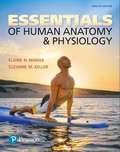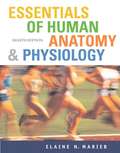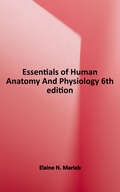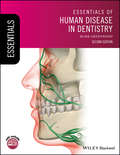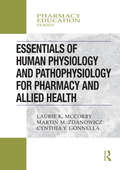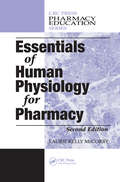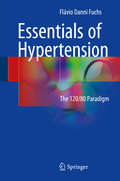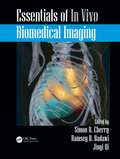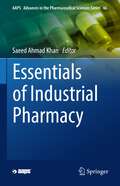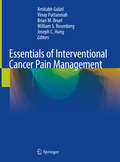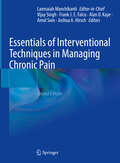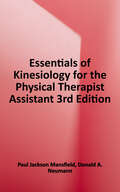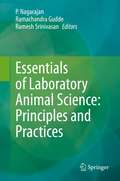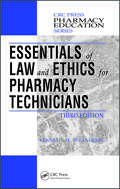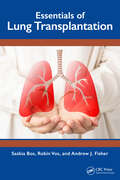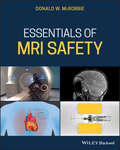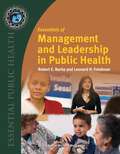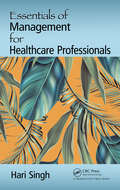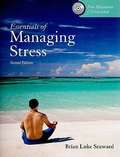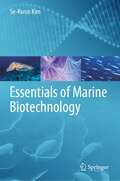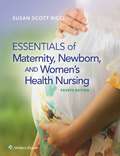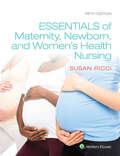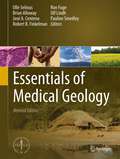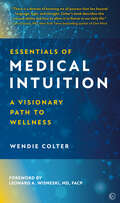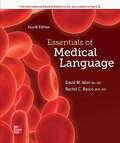- Table View
- List View
Essentials of Human Anatomy and Physiology
by Suzanne Keller Elaine MariebThoroughly updated with dozens of new figures, photos, and current information on medical recommendations and terminology, the 12th Edition continues to set the standard for brief, accessible one-semester A&P texts. The authors’ hallmark clear and friendly writing style has been strengthened with familiar analogies and abundant mnemonic cues that help in learning and remembering concepts. Continuing to offer just the right balance of anatomy, physiology, and clinical coverage, engaging new chapter previews help learners hone in on what structures and functions they are studying, how they function, and why they are important to learn.
Essentials of Human Anatomy and Physiology
by Elaine Marieb<i>Essentials of Human Anatomy and Physiology, Eighth Edition</i> continues to set the standard for A&P texts by helping readers better visualize and understand the structure and function of the human body. New information on hot topics like DNA fingerprinting, bone implants for children, stem cell research, and obesity draws readers into the material. Elaine Marieb's clear and friendly writing style emphasizes the relevance of anatomy and physiology to readers' lives and careers. It clarifies concepts, defines key terms, and offers just the right balance of anatomy, physiology, and clinical coverage to make the content complete without being overwhelming.
Essentials of Human Anatomy and Physiology
by Elaine N. MariebAward-winning author Elaine N. Marieb brings her unique understanding of students' needs to Essentials of Human Anatomy & Physiology, Sixth Edition. The hallmarks of this popular text, which has introduced countless allied health students to the structure and function of the human body, are a clear and friendly writing style, just the right level of detail, and features that emphasize the relevance of A&P to students' lives and careers. The author uses numerous analogies to clarify concepts and consistently defines key terms to assist students with little or no science background. The Sixth Edition includes clearer, crisper art to help students better visualize the human body. In addition, a greater career orientation assists students in understanding and remembering information vital to making a successful transition to their professional lives.
Essentials of Human Disease in Dentistry (Essentials (Dentistry))
by Mark GreenwoodA comprehensive guide to providing effective dental treatment and care to patients affected by diseases Essentials of Human Disease in Dentistry, Second Edition takes an integrated approach to dentistry and how it relates to general medicine, surgery, pharmacology, therapeutics, pathology and microbiology. Building on the success of the Textbook of Human Disease in Dentistry, this new edition has been updated with a new layout, featuring key topics, learning objectives and practical clinical advice in each chapter. This accessible guide is structured around the systems of the body and covers all major diseases and conditions with their aetiology, symptoms, and treatments. The focus is on the relevance of particular diseases and their drug treatment in relation to dentistry and patient dental management. This vital resource: Promotes a better understanding of how to provide effective dental treatment to patients affected by diseases Presents illustrative examples and helpful clinical photographs throughout Includes a new chapter on the importance of understanding shock Features self-assessment questions at the end of each chapter, and a companion website hosting downloadable images from the book Essentials of Human Disease in Dentistry, Second Edition is an invaluable resource for undergraduate dentistry students as well as newly qualified dentists preparing for the MFDS exam.
Essentials of Human Physiology and Pathophysiology for Pharmacy and Allied Health (Pharmacy Education Series)
by Laurie K. McCorry Martin M. ZdanowiczCombining two separate textbooks entitled Essentials of Human Physiology for Pharmacy and Essentials of Pathophysiology for Pharmacy into one cohesive volume, this new book seamlessly integrates material related to normal human physiology and pathophysiology into each chapter. <P><P>Chapters include: <P><P>Study objectives at the beginning of each chapter; <P><P>Summary tables, flow charts, diagrams, and key definitions; <P><P>Real life case studies to emphasize clinical application and stimulate student critical thinking; <P><P>An emphasis on the rationale for drug therapy; <P><P>Simple, straightforward language. <P><P>Written by authors with extensive teaching experience in the areas, Essentials of Human Physiology and Pathophysiology for Pharmacy and Allied Health is a concise learning instrument that will guide students in pharmacy and allied health programs.
Essentials of Human Physiology for Pharmacy (Pharmacy Education Series)
by Laurie Kelly McCorryA firm grasp of the functions of living organisms is one of the most important prerequisites to pharmacy study. The long-awaited second edition of Essentials of Human Physiology presents concepts in physiology in a way that prepares students for their subsequent study of pathophysiology, pharmacology, and pharmacotherapeutics.Thoroughly
Essentials of Hypertension
by Flávio Danni FuchsThe main purpose of this book is to select and present the most essential information about hypertension. It aims to select all the more relevant data to guide the attitudes to prevent, diagnose, and treat hypertension. Hypertension accounts for more than 50% of deaths from stroke and ischemic heart disease worldwide. New blood pressure (BP) diagnostic thresholds for hypertension were released, which were set at 130/80 mmHg. As a consequence, millions of individuals in the world will be diagnosed as hypertensive, recognizing that they are at greater risk of presenting a CV event. Prevention and control of high BP will become the main focus for reducing the burden of CV disease, requiring a changing of cultural beliefs in some way similar to what happened in the last century with smoking. Strategies for prevention of the rising of BP with age, and the BP reduction in individuals already with high levels, are more complex than those related to smoking control. These strategies involve solid evidence to be implemented in populations. The extensive scientific literature dealing with hypertension and BP regulation is among the top dedicated to a single disease. The chapters and contents follow the clinical reasoning pathways. The characterization of the risks of high blood pressure is presented in the first chapter, discussing the evidence that led to changes in diagnostic thresholds and to the recommendations for maintaining BP within these limits in populations. Reasons for BP rising with age will follow, identifying the causes that must be fought to preventing the incidence of hypertension. Diagnosis of hypertension deserves a special chapter. The final chapter presents the fundamentals to select drug and non-drug therapies indicated in the prevention and controlling of high blood pressure.
Essentials of In Vivo Biomedical Imaging
by Simon R. Cherry Ramsey D. Badawi Jinyi QiWhile there are many excellent texts focused on clinical medical imaging, there are few books that approach in vivo imaging technologies from the perspective of a scientist or physician-scientist using, or interested in using, these techniques in research. It is for these individuals that Essentials of In Vivo Biomedical Imaging is written.Featurin
Essentials of Industrial Pharmacy (AAPS Advances in the Pharmaceutical Sciences Series #46)
by Saeed Ahmad KhanEssentials of Industrial Pharmacy is an attempt to comprehensively present, in a single book, various pharmaceutical processes and equipment that are frequently used for production of pharmaceutical dosage forms, along with quality control tests of these dosage forms. Pictorial/graphical illustrations provide easier understanding of complex pharmaceutical concepts, manufacturing processes of pharmaceutical dosage forms. Since it is imperative for pharmacy students to have a clear understanding of the basic concepts used in development of drugs into suitable and stable dosage forms.This book offers a wealth of information regarding basic aspects of pharmaceutical processes and dosage forms, in a single book, for undergraduate pharmacy students or science students (with no pharmacy background) intended to work in the pharmaceutical Industry.
Essentials of Interventional Cancer Pain Management
by Amitabh Gulati Vinay Puttanniah Brian M. Bruel William S. Rosenberg Joseph C. HungThis text provides a comprehensive review and expertise on various interventional cancer pain procedures. The first part of the text addresses the lack of consistency seen in the literature regarding interventional treatment options for specific cancer pain syndromes. Initially, it discusses primary cancer and treatment-related cancer pain syndromes that physicians may encounter when managing cancer patients. The implementation of paradigms that can be used in treating specific groups of cancer such as breast cancer, follows. The remainder of the text delves into a more common approach to addressing interventional cancer pain medicine. After discussing interventional options that are commonly employed by physicians, the text investigates how surgeons may address some of the more severe pain syndromes, and covers the most important interventional available for our patients, intrathecal drug delivery. Chapters also cover radiologic options in targeted neurolysis and ablative techniques, specifically for bone metastasis, rehabilitation to address patients’ quality of life and function, and integrative and psychological therapies. Essentials of Interventional Cancer Pain Management globally assesses and addresses patients’ needs throughout the cancer journey. Written by experts in the field, and packed with copious tables, figures, and flow charts, this book is a must-have for pain physicians, residents, and fellows.
Essentials of Interventional Techniques in Managing Chronic Pain
by Laxmaiah ManchikantiThis comprehensive review covers the full and latest array of interventional techniques for managing chronic pain. Chapters are grouped by specific treatment modalities that include spinal interventional techniques, non-spinal and peripheral nerve blocks, sympathetic interventional techniques, soft tissue and joint injections, and implantables. This second edition features new chapters covering challenges with opioid therapy, impact of COVID-19, and spinal interventional techniques.Practical step-by-step and evidence-based guidance is given to each approach in order to improve the clinician's understanding. Innovative and timely, Essentials of Interventional Techniques in Managing Chronic Pain is a critical resource for anesthesiologists, neurologists, and rehabilitation and pain physicians.
Essentials of Kinesiology for the Physical Therapist Assistant
by Donald A. Neumann Paul Jackson MansfieldThis book builds on previous editions by delivering a rich and varied learning experience that is needed to succeed in today's fast-paced PTA education programs. <p><p>Clear, concise explanations of anatomy and function, full-color illustrations and unique atlas-style chapters make even the most complex concepts easy to master. In addition, a robust lineup of on- and off-line resources, featuring a companion Evolve website, give students the tools they need to succeed in both the classroom and the clinical setting! <p><p>Author team of Paul Mansfield and Don Neumann represent a rich blend of their experiences and expertise. <p>- Outstanding artwork with more than 600 full-color photos and drawings help you understand key concepts. <p>- Atlas-style muscle presentations clearly link specific muscles or muscle groups with relevant information. <p>- Clinical Insight and Considerations boxes link the concepts of kinesiology with their clinical applications. <p>- Summary boxes and tables pull content together into concise, reader-friendly format. <p>- Study questions and key terminology serves as a valuable study tool for exam preparation. <p>- Learning Objectives serve as an overview of each chapter as well as a handy checklist for review. <p>- Goniometry boxes added at the end of each joint-specific chapter illustrate principles of goniometry as they relate to kinesiology. <p>- Art from Neumann added where appropriate to help illustrate material. <p>- Thoroughly revised content reflects the very latest in Kinesiology.
Essentials of Laboratory Animal Science: Principles and Practices
by Ramesh Srinivasan P. Nagarajan Ramachandra GuddeThis book comprehensively reviews the anatomy, physiology, genetics and pathology of laboratory animals as well as the principles and practices of using laboratory animals for biomedical research.It covers the design of buildings used for laboratory animals, quality control of laboratory animals, and toxicology, and discusses various animal models used for human diseases. It also highlights aspects, such as handling and restraint and administration of drugs, as well as breeding and feeding of laboratory animals, and provides guidelines for developing meaningful experiments using laboratory animals.Further, the book discusses various alternatives to animal experiments for drug and chemical testing, including their advantages over the current approaches. Lastly, it examines the potential effect of harmful pathogens on the physiology of laboratory animals and discusses the state of art in in vivo imaging techniques.The book is a useful resource for research scientists, laboratory animal veterinarians, and students of laboratory animal medicine.
Essentials of Law and Ethics for Pharmacy Technicians (Pharmacy Education Series)
by Kenneth M. StrandbergAs the practice of modern medicine becomes more and more pharmacology dependent, the role of pharmacy technicians is becoming more complex. This is true in terms of the medications they are required to deliver, as well as the legal responsibilities and ethical considerations that come with administering those medicines. Essentials of Law and Ethics
Essentials of Lung Transplantation
by Saskia Bos Robin Vos Andrew J. FisherLung transplantation (LTx) is a life-saving treatment for people with severe end-stage lung disease. This concise, well-illustrated practical handbook provides a comprehensive overview of pre-, peri-, and post-transplant care addressing the complexity of lung transplantation, general follow-up, and common post-transplant complications. Simple, to-the-point short topics will answer potential questions by LTx trainees, fellows, and consultants; educating healthcare professionals involved in the care of LTx patients explaining the post-transplant journey along with examples of real-life cases.Key Features Presents answers to common clinical questions during the post-transplant journey of a lung transplant recipient Shares practical/pragmatic approaches to diagnostic and management issues seen in the lung transplant population for clinicians from both within and external to transplant centres internationally, to gain practical experience Summarises the clinical aspects of LTx, with easy-to-navigate short text blocks, bullet points, and illustrations
Essentials of MRI Safety
by Donald W. McRobbieEssentials of MRI Safety is a comprehensive guide that enables practitioners to recognise and assess safety risks and follow appropriate and effective safety procedures in clinical practice. The text covers all the vital aspects of clinical MRI safety, including the bio-effects of MRI, magnet safety, occupational exposure, scanning passive and active implants, MRI suite design, institutional governance, and more. Complex equations and models are stripped back to present the foundations of theory and physics necessary to understand each topic, from the basic laws of magnetism to fringe field spatial gradient maps of common MRI scanners. Written by an internationally recognised MRI author, educator, and MRI safety expert, this important textbook: Reflects the most current research, guidelines, and MRI safety information Explains procedures for scanning pregnant women, managing MRI noise exposure, and handling emergency situations Prepares candidates for the American Board of MR Safety exam and other professional certifications Aligns with MRI safety roles such as MR Medical Director (MRMD), MR Safety Officer (MRSO) and MR Safety Expert (MRSE) Contains numerous illustrations, figures, self-assessment tests, key references, and extensive appendices Essentials of MRI Safety is an indispensable text for all radiographers and radiologists, as well as physicists, engineers, and researchers with an interest in MRI.
Essentials of Management and Leadership in Public Health
by Leonard H. Friedman Robert E BurkeDriven by recent events and new trends, public health training increasingly requires new and more advanced information—leadership and management skills drawn from business, industry, education, and government. This text offers basic foundation for students entering the field of public health management with a specific focus on developing knowledge and skills in the cross cutting competency domains identified by the ASPH. Important Notice: The digital edition of this book is missing some of the images or content found in the physical edition.
Essentials of Management for Healthcare Professionals
by Hari SinghMedical care is an industry and private providers and hospitals are the major service providers. They operate on business principles. Hospitals are getting highly specialized and complex. The diagnostics and therapeutics are technology intensive. Private establishments have to compete with one another to remain in business. They strive to induct the best talent and latest technical know-how, resulting in ever-increasing costs to patients. Patients, who pay high charges, demand quality as a matter of right. To meet the challenge, hospitals are constrained to bring in professionalism in their systems and services. They appoint qualified professional managers to manage their clinics and hospitals with a view to sparing health professionals to focus on clinical care. Whether right or wrong, ‘management’ is often associated with authority and power. As a result, the medical professionals are reduced to secondary level in some organizations. To retain commanding positions in medical organizations, it has become necessary for the healthcare professionals to learn ‘management’, at least its basics. On the other hand, non-medical managers while managing healthcare services do not get the required cooperation from the medical professionals, as the latter are often secretive and not willing to share medical knowledge. If medical knowledge is demystified, non-medical managers can perform many functions in healthcare organizations proficiently. Both medical and non-medical managers can complement each other in providing quality healthcare services. The book aims to orient clinicians (including physicians and nurses) and other healthcare professionals on the essentials of business management and to familiarize them with management terms and jargon. They can learn to be effective managers besides being health professionals. Similarly, non- medical managers can get familiarized to nuances of clinical care and special managerial requirements of healthcare facilities. They all will be able to relate processes in healthcare settings with the concepts of business management. They can develop expertise on patient relationship management
Essentials of Managing Stress (2nd edition)
by Brian Luke SeawardThis book teaches practical skills and techniques to handle the daily stresses in life. While other texts are heavy with theory, this book offers both theory and effective application. Book emphasizes that one must look at the mind, body, and spirit as equal parts of the whole person to deal with stress effectively.
Essentials of Marine Biotechnology
by Se-Kwon KimThis textbook introduces marine biotechnology by collecting the key knowledge on genetics, fish breeding, genetic diversity, seaweed production and microalgae biotechnology, and explores marine biomaterials and how they can benefit human health. Covering the latest applications of marine biotechnology in natural product development, genomics, transgenic technology, cosmeceuticals, nutraceuticals, and pharmaceutical development, it particularly focuses on future biological resources, developing functional materials from marine life, production of marine bioenergy and marine microbial resources and biotechnology. The author explains the structure of the book in an introductory note, and each chapter offers a detailed overview and conclusion to help readers better grasp the acquired knowledge. Lastly, the final part provides a comprehensive glossary with brief explanations of the key concepts in marine biotechnology. Written by a leading expert in the field with more than 30 years of teaching experience, this book broadens students’ understanding of the basics and recent developments in marine biotechnology.
Essentials of Maternity, Newborn, and Women's Health Nursing (Fourth Edition)
by Susan RicciHelp your students prepare for effective maternity nursing practice! This updated 4th Edition of Susan Ricci’s practical text provides students with the essential information they need to care for women and their families, and also to assist them in making the right choices safely, intelligently, and with confidence. With integrated case studies and nursing procedures throughout, the text takes a nursing process approach, builds on previously mastered content, and includes much that is new, including increased coverage of the cultural and global aspects of maternity and women’s health care. <P><P>KEY FEATURES <ul> <li>Revised Unfolding Case Studies in every chapter, now paired with patient photos, give students an opportunity to apply concepts to real-life scenarios.</li> <li>Up-to-date Nursing Procedures provide clear, step-by-step explanations, along with illustrations of variations in nursing care, to help students master vital skills.</li> <li>New Bringing It All Together Case Studies begin in the end-of-chapter worksheets and unfold online, providing extended opportunities for students to connect learning to practice.</li> <li>New! Concept Mastery Alerts improve students’ understanding of potentially confusing topics as identified by Lippincott’s Adaptive Learning Powered by PrepU.</li> <li>Updated Teaching Guidelines, now with rationales, prepare students to educate families.</li> <li>Additional evidence-based research findings promote evidence-based maternity nursing practice and interventions.</li> <li>More than 700 NCLEX-Style Review Questions help students review important concepts and prepare for the NCLEX-RN.</li> </ul> <P><P>This leading content is also incorporated into Lippincott CoursePoint+, a dynamic learning solution that integrates this book’s curriculum, adaptive learning tools, virtual simulations, real-time data reporting, and the latest evidence-based practice content together into one powerful student learning solution. Lippincott CoursePoint+ improves the nursing students’ critical thinking and clinical reasoning skills to prepare them for practice. Learn more at www.NursingEducationSuccess.com/CoursePoint.
Essentials of Maternity, Newborn, and Women’s Health
by Susan RicciGive students the confidence and competence to meet the challenges of today’s maternity, newborn, and women’s health nursing practice. Focusing on the reproductive issues of women throughout the lifespan, Essentials of Maternity, Newborn, and Women's Health Nursing, Fifth Edition, builds the knowledge and clinical capabilities students need to excel on the NCLEX® and confidently care for women and their families. Updated with the latest practices, interventions and cultural considerations, this practical text immerses students in realistic nursing case studies, delivering step-by-step guidance and real-world clinical practice to prepare students for success throughout their nursing careers.
Essentials of Medical Geology
by Olle Selinus Brian Alloway Jose Centeno Pauline Smedley Robert Finkelman Ron Fuge Ulf LindhEssentials of Medical Geology reviews the essential concepts and practical tools required to tackle environmental and public health problems. It is organized into four main sections. The first section deals with the fundamentals of environmental biology, the natural and anthropogenic sources of health elements that impact health and illustrate key biogeochemical transformations. The second section looks at the geological processes influencing human exposure to specific elements, such as radon, arsenic, fluorine, selenium and iodine. The third section presents the concepts and techniques of pathology, toxicology and epidemiology that underpin investigations into the human health effects of exposure to naturally occurring elements. The last section provides a toolbox of analytical approaches to environmental research and medical geology investigations. Essentials of Medical Geology was first published in 2005 and has since won three prestigious rewards. The book has been recognized as a key book in both medical and geology fields and is widely used as textbook and reference book in these fields. For this revised edition, editors and authors have updated the content that evolved a lot during 2005 and added two new chapters, on public health, and agriculture and health. This updated volume can now continue to be used as a textbook and reference book for all who are interested in this important topic and its impacts the health and wellbeing of many millions of people all over the world. · Addresses key topics at the intersection of environmental science and human health · Developed by 60 international experts from 20 countries and edited by professionals from the International Medical Geology Association (IMGA) · Written in non-technical language for a broad spectrum of readers, ranging from students and professional researchers to policymakers and the general public · Includes color illustrations throughout, references for further investigation and other aids to the reader
Essentials of Medical Intuition: A Visionary Path to Wellness
by Wendie ColterAimed at wellness professionals who want to use their intuition in their practice, and anyone seeking answers to their health issues from their own body and energy systems, this is the most comprehensive and nuanced guide to using Medical Intuition to promote wellbeing.Are you a wellness professional experiencing burnout, frustration, and disillusionment with the current healthcare systems? Are you a patient or client who&’s curious about seeking answers to your health issues from your own body and energy systems?This comprehensive and accessible guide, grounded in the most up-to-date scientific research and case studies, explains everything you need to know about medical intuition – a revolutionary new perspective in healthcare. The illuminating skill of medical intuition is designed to provide fast, pertinent intuitive health assessments that can be used as both a standalone practice and as a powerful support to health and wellness care of every kind. Intended to uncover the hidden sources of energetic resistance that may be blocking optimal wellbeing, medical intuition is now being increasingly discussed in integrative healthcare, its efficacy supported by innovative, growing research and case studies. In this thought-provoking new guide, discover exactly what medical intuition is – and how it can transform the lives of practitioners, patients, and clients.
Essentials of Medical Language
by David Allan Rachel BascoEssentials of Medical Language will help you learn the terminology and language of modern health care in a way that bridges the gap between the classroom and a clinical setting. This textbook provides you with terminology, exercises, images and examples you can apply to other courses and within your career. You will step into the role of a health professional in every chapter and experience medical language illustrated through authentic patient cases.
